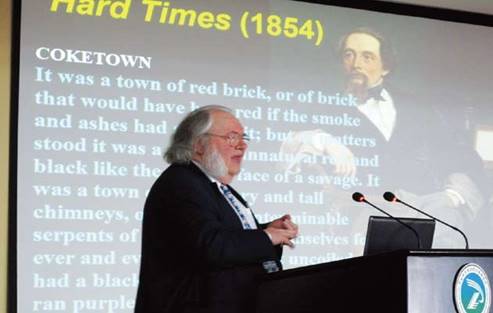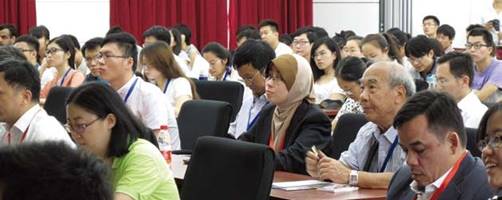"The legal approach to combatting pollution, however, only reduces the exposure to pollution, rather than the hazard itself,” asserted Prof. Kenneth R. Seddon from Queen’s University Belfast (QUB), UK, in his plenary lecture when reviewing the rise of pollution in the West as a by-product of the Industrial Revolution and the enhanced legal regulation in USA as an answer to this plight. “The real solution lies in green chemistry,” he continued. Calling for joint efforts from the scientific community to meet the challenges, and highlighting the role of green technology in the global battle against pollution, the prestigious chemist, who is widely acknowledged as a founder of green chemistry, echoed the theme for the 2015 CAS- TWAS Symposium on Green Technology for Sustainable Development (2015 Green Tech) in Beijing.

"The real solution lies in green chemistry,” Prof. Kenneth R. Seddon from Queen’s University Belfast, UK comments in a brief review of the combat against pollution ahead of his plenary speech on application of ionic liquids. (Photo by SONG J.)

Participants of the 2015 Green Tech. (Photo by SONG J.)
"Bonding” Time
Held from July 23 to 25, the symposium was organized jointly by CAS and TWAS (the World Academy of Sciences for the advancement of science in developing countries), and co-hosted by CAS-TWAS Centre of Excellence for Green Technology (CEGT) and the CAS Institute of Process Engineering (IPE), in which CEGT is based.
One of the main targets of this symposium, according to Prof. ZHANG Suojiang, head of CEGT and IPE, is to bring together academic researchers in different fields to discuss the possibility of integrating new green technologies for the common goal of sustainable development, and encourage better communication among engineering scientists, practitioners, and policy makers from both developing and developed countries.
For this sake, the symposium invited leading researchers from all over the world to report their latest progress in different areas, hoping to encourage brainstorming and inspire interdisciplinary cooperation.
Revolving around sustainable development, topics of the symposium covered a wide spectrum of engineering science, ranging from green solvents and green chemistry, catalytic reaction and process engineering, biotechnology and bioprocess, nanotechnology and materials, renewable energy and green technology, to pollution control and other related topics.
Since 2013, GEGT has organized several training workshops and symposia on the subject.